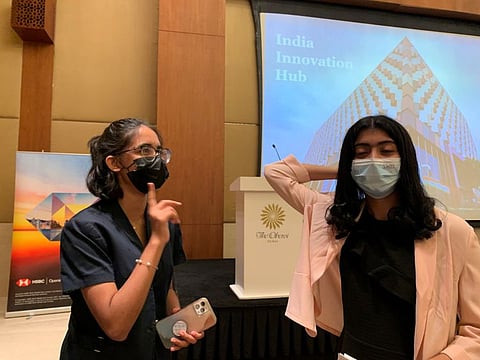UAE students making a positive difference with mobility solutions for elderly
From wheelchair to armbands for patients with Parkinson, gadgets to make life easier


Dubai: UAE students are going all out to make a difference to their community. Students of GEMS Wellington Academy — Silicon Oasis have come up with an incredible initiative for the benefit of senior citizens.
Australian expatriate student Matthew Andreopoulos, 17, in Year 12 of the school, and his batch mate, Indian expatriate Tarun Chandra, 17, have come up with an innovative idea for new mobility solutions. The boys, along with their team of professors, fellow students and experts in the field have designed an ‘autonomous’ wheel chair for the elderly.

For the record, Otis Made to Move Communities is an annual global student challenge that inspires students to develop creative, STEM-based solutions to real-world mobility issues in their communities. “The aim is to allow people freedom to connect and thrive in a taller, faster, smarter world,” explained Al Qaisi.
He added: “The number of older adults is projected to double by 2050, according to the United Nations World Population Prospects report. In the UAE, according to Dubai Health Authority (DHA), the ageing population is expected to increase from 6 per cent in 2017 to 29 per cent by 2050. Having access to inclusive mobility solutions that allow the nation’s elderly to remain active, independent and safe within our communities will prove crucial in the coming years.”
“As part of the programme, Otis employees virtually met and mentored us [students] over eight weeks to conduct research and develop innovative ideas for mobility to be inclusive for all,” Matthew added.
A global panel of Otis judges evaluated the presentations and awarded grants, which would be re-invested in each school or organisation’s STEM programme.

Meanwhile, another set of 12-year-old students from GEMS Modern Academy have been making a difference to the community. Indian expatriate students Shreyram Seetharaman, Samarth Sujeeth and Vihaan Sachin Suvarna have developed an app, a prototype in a software known as Thunkable. The Grade 7 students were ably supported by Eriyat Lakshmi Devi, assistant dean of Studies-Entrepreneurship at GMA.
“We have been able to achieve a successful, working digital prototype. The app serves as a means of registration so that users can register from the comfort of their homes. This will make the drive queue-less and easy to use for people who cannot afford to waste time,” said Seetharaman. “This is only a working prototype. We are waiting for the funding to make this a proper app. After this, it will be available in App Store and Play Store,” added Seetharaman.

The app tells you where to dispose of medicine appropriately. The app is a registration method for users to be able to participate in this drive. It will ask them for information about them to ensure security and register properly. The also provides information about the EcoMedz drive.

Some features of the app include easy and quick registration, unique colour scheme, easy to understand information and time-efficient registration.
Five 14-year-old students from the school’s Grade 10 have developed an armband for people with Parkinson’s disease to lead normal, better lives. The team comprises of Misha Raval, Soham Chakraborty, Arhaan Singh, Advaith Salil Pillai and Tanisha Mathur. The students were guided by their professor Eriyat Lakshmi Devi.
How the armband works
The sleek and modern armband opposes the tremors produced in the victims’ hands. “We have installed a simple device that perfectly opposes the vibrations of the user’s arm. In other words, it helps steady the arm and build arm control,” said Raval.
“There are sensors to detect what frequency the tremors are occurring at. Then, setting that speed to be the one at which the armband will produce tremors to nullify quivering of the joints,” she added.



Six months to conceive the product




